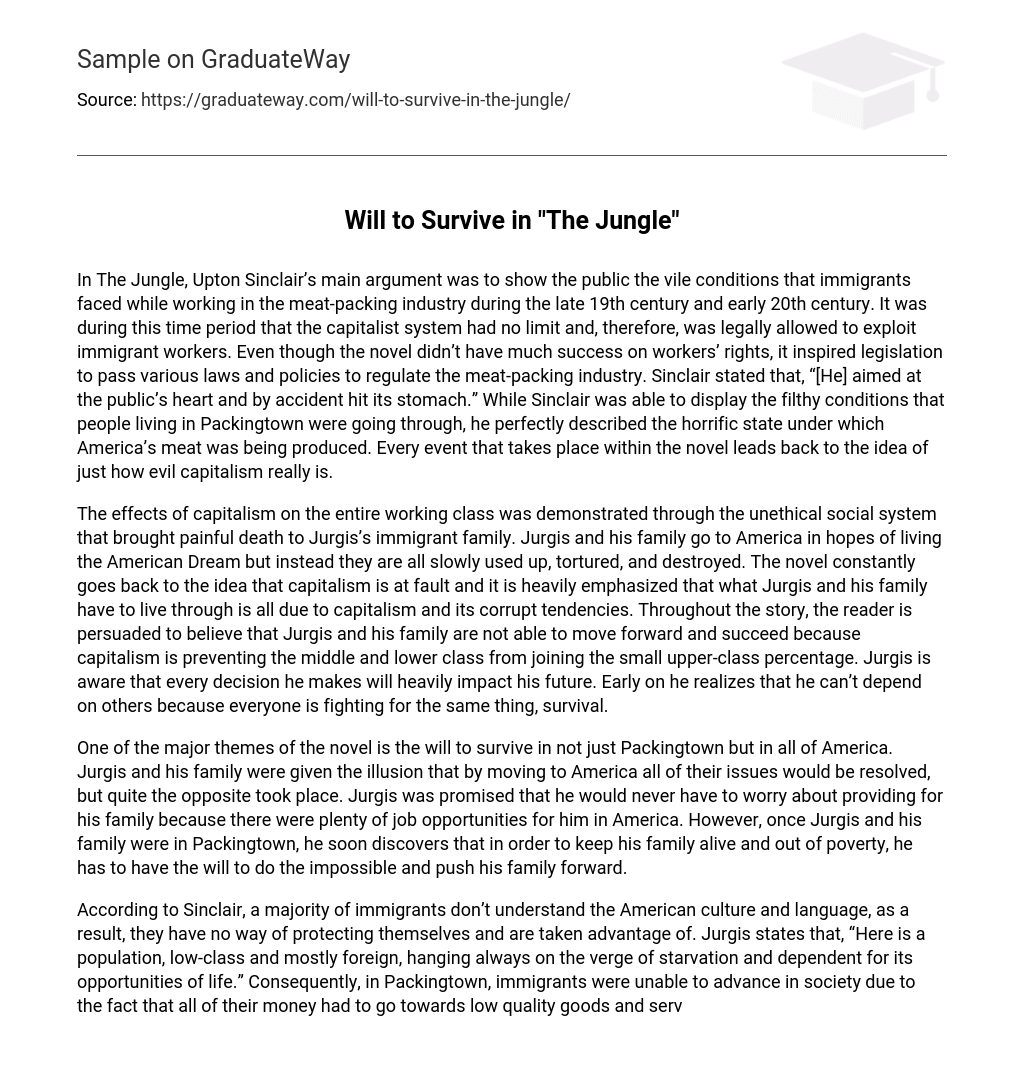In The Jungle, Upton Sinclair’s main argument was to show the public the vile conditions that immigrants faced while working in the meat-packing industry during the late 19th century and early 20th century. It was during this time period that the capitalist system had no limit and, therefore, was legally allowed to exploit immigrant workers. Even though the novel didn’t have much success on workers’ rights, it inspired legislation to pass various laws and policies to regulate the meat-packing industry. Sinclair stated that, “[He] aimed at the public’s heart and by accident hit its stomach.” While Sinclair was able to display the filthy conditions that people living in Packingtown were going through, he perfectly described the horrific state under which America’s meat was being produced. Every event that takes place within the novel leads back to the idea of just how evil capitalism really is.
The effects of capitalism on the entire working class was demonstrated through the unethical social system that brought painful death to Jurgis’s immigrant family. Jurgis and his family go to America in hopes of living the American Dream but instead they are all slowly used up, tortured, and destroyed. The novel constantly goes back to the idea that capitalism is at fault and it is heavily emphasized that what Jurgis and his family have to live through is all due to capitalism and its corrupt tendencies. Throughout the story, the reader is persuaded to believe that Jurgis and his family are not able to move forward and succeed because capitalism is preventing the middle and lower class from joining the small upper-class percentage. Jurgis is aware that every decision he makes will heavily impact his future. Early on he realizes that he can’t depend on others because everyone is fighting for the same thing, survival.
One of the major themes of the novel is the will to survive in not just Packingtown but in all of America. Jurgis and his family were given the illusion that by moving to America all of their issues would be resolved, but quite the opposite took place. Jurgis was promised that he would never have to worry about providing for his family because there were plenty of job opportunities for him in America. However, once Jurgis and his family were in Packingtown, he soon discovers that in order to keep his family alive and out of poverty, he has to have the will to do the impossible and push his family forward.
According to Sinclair, a majority of immigrants don’t understand the American culture and language, as a result, they have no way of protecting themselves and are taken advantage of. Jurgis states that, “Here is a population, low-class and mostly foreign, hanging always on the verge of starvation and dependent for its opportunities of life.” Consequently, in Packingtown, immigrants were unable to advance in society due to the fact that all of their money had to go towards low quality goods and services. These low-quality goods and services were what kept them living in poverty. It is for these reasons that the power of wealth will forever keep the wealthy at the top and the rest at the bottom. Thus, making it impossible for immigrants to move up in society.
Power of wealth is another major theme in the novel that is heavily seen in not just Packingtown, but in all of America. Even though Jurgis and his family were warned about the evils of capitalism, they fall prey to the major business companies. They had given up everything for someone else’s gain and once they became too weak to continue working, they were disposed of. Everyone part of the working class loses a piece of themselves during this time because of the economic powers beyond their control. In the end, no matter how long and hard they worked, only the strongest survived.
Those in power made it very clear that all they wanted was to use up as much as they could from all of their workers before discarding them. In the capitalist jungle, “Human creatures might be hunted down and destroyed by the wild-beast powers of nature.” In this society, people are categorized as either predator or prey, where only the strong survive. However, in this scenario the predator is hunger and cold, not people. Jurgis and his family fell prey to these factors, and as a result death was brought upon Jurgis’s family.
The Jungle did a phenomenal job at describing all of the gruesome details that took place in the meat-packing industry. It addresses how people working under those conditions put their lives at risk every day from the moment they would start their work shift to the moment their shift ended. Not only was the working class at risk of death while at work, but anyone who consumed meat was at risk as well because there were no laws or policies at the time to regulate the meat-packing industries. By the end of the novel, Sinclair perfectly illustrates that in order to change the harsh conditions and bring a positive change in society, it would be best to switch from a capitalist economy to a socialist.
One thing that The Jungle should’ve addressed was to show how our society would’ve been if it had changed from purely being capitalist to a socialist economy instead. At the end of the novel, the readers are persuaded to believe that our society is better off being socialist, however, we were not given insight details on what other positive changes being a socialist economy would have brought.
Overall, The Jungle brought about a great deal of change in society. Without the novel, the laws and policies regulating the meat-packing industry would’ve either taken longer to put into action or those regulations would’ve never existed.





